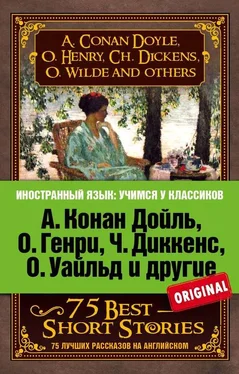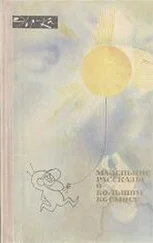‘Harbour!’ cried landlord; ‘why, you’re fifty miles from the sea.’
Captain Roberts didn’t turn a hair. ‘So much as that, is it?’ he said coolly. ‘Well, it’s of no consequence.’
Landlord was a bit upset at this. ‘I don’t want to be unneighbourly,’ he said, ‘but I wish you hadn’t brought your ship into my field. You see, my wife sets great store on these turnips.’
The captain took a pinch of snuff out of a fine gold box that he pulled out of his pocket, and dusted his fingers with a silk handkerchief in a very genteel fashion. ‘I’m only here for a few months,’ he said; ‘but if a testimony of my esteem would pacify your good lady I should be content,’ and with the words he loosed a great gold brooch from the neck of his coat and tossed it down to landlord.
Landlord blushed as red as a strawberry. ‘I’m not denying she’s fond of jewellery,’ he said, ‘but it’s too much for half a sackful of turnips.’ And indeed it was a handsome brooch.
The captain laughed. ‘Tut, man,’ he said, ‘it’s a forced sale, and you deserve a good price. Say no more about it;’ and nodding good-day to us, he turned on his heel and went into the cabin. Landlord walked back up the lane like a man with a weight off his mind. ‘That tempest has blowed me a bit of luck,’ he said; ‘the missus will be much pleased with that brooch. It’s better than blacksmith’s guinea, any day.’
Ninety-seven was Jubilee year, the year of the second Jubilee, you remember, and we had great doings at Fairfield, so that we hadn’t much time to bother about the ghost-ship though anyhow it isn’t our way to meddle in things that don’t concern us. Landlord, he saw his tenant once or twice when he was hoeing his turnips and passed the time of day, and landlord’s wife wore her new brooch to church every Sunday. But we didn’t mix much with the ghosts at any time, all except an idiot lad there was in the village, and he didn’t know the difference between a man and a ghost, poor innocent! On Jubilee Day, however, somebody told Captain Roberts why the church bells were ringing, and he hoisted a flag and fired off his guns like a loyal Englishman. ’Tis true the guns were shotted, and one of the round shot knocked a hole in Farmer Johnstone’s barn, but nobody thought much of that in such a season of rejoicing.
It wasn’t till our celebrations were over that we noticed that anything was wrong in Fairfield. ’Twas shoemaker who told me first about it one morning at the “Fox and Grapes.” ‘You know my great great-uncle?’ he said to me.
‘You mean Joshua, the quiet lad,’ I answered, knowing him well.
‘Quiet!’ said shoemaker indignantly. ‘Quiet you call him, coming home at three o’clock every morning as drunk as a magistrate and waking up the whole house with his noise.’
‘Why, it can’t be Joshua!’ I said, for I knew him for one of the most respectable young ghosts in the village.
‘Joshua it is,’ said shoemaker; ‘and one of these nights he’ll find himself out in the street if he isn’t careful.’
This kind of talk shocked me, I can tell you, for I don’t like to hear a man abusing his own family, and I could hardly believe that a steady youngster like Joshua had taken to drink. But just then in came butcher Aylwin in such a temper that he could hardly drink his beer. ‘The young puppy! the young puppy!’ he kept on saying; and it was some time before shoemaker and I found out that he was talking about his ancestor that fell at Senlac [412].
‘Drink?’ said shoemaker hopefully, for we all like company in our misfortunes, and butcher nodded grimly.
‘The young noodle,’ he said, emptying his tankard.
Well, after that I kept my ears open, and it was the same story all over the village. There was hardly a young man among all the ghosts of Fairfield who didn’t roll home in the small hours of the morning the worse for liquor. I used to wake up in the night and hear them stumble past my house, singing outrageous songs. The worst of it was that we couldn’t keep the scandal to ourselves and the folk at Greenhill began to talk of ‘sodden Fairfield’ and taught their children to sing a song about us:
‘Sodden Fairfield, sodden Fairfield, has no use for bread-and-butter,
Rum for breakfast, rum for dinner, rum for tea, and rum for supper!’
We are easy-going in our village, but we didn’t like that.
Of course we soon found out where the young fellows went to get the drink, and landlord was terribly cut up that his tenant should have turned out so badly, but his wife wouldn’t hear of parting with the brooch, so that he couldn’t give the Captain notice to quit. But as time went on, things grew from bad to worse, and at all hours of the day you would see those young reprobates sleeping it off on the village green. Nearly every afternoon a ghost-wagon used to jolt down to the ship with a lading of rum, and though the older ghosts seemed inclined to give the Captain’s hospitality the go-by, the youngsters were neither to hold nor to bind.
So one afternoon when I was taking my nap I heard a knock at the door, and there was parson looking very serious, like a man with a job before him that he didn’t altogether relish. ‘I’m going down to talk to the Captain about all this drunkenness in the village, and I want you to come with me,’ he said straight out.
I can’t say that I fancied the visit much, myself, and I tried to hint to parson that as, after all, they were only a lot of ghosts it didn’t very much matter.
‘Dead or alive, I’m responsible for the good conduct,’ he said, ‘and I’m going to do my duty and put a stop to this continued disorder. And you are coming with me John Simmons.’ So I went, parson being a persuasive kind of man.
We went down to the ship, and as we approached her I could see the Captain tasting the air on deck. When he saw parson he took off his hat very politely and I can tell you that I was relieved to find that he had a proper respect for the cloth. Parson acknowledged his salute and spoke out stoutly enough. ‘Sir, I should be glad to have a word with you.’
‘Come on board, sir; come on board,’ said the Captain, and I could tell by his voice that he knew why we were there. Parson and I climbed up an uneasy kind of ladder, and the Captain took us into the great cabin at the back of the ship, where the bay-window was. It was the most wonderful place you ever saw in your life, all full of gold and silver plate, swords with jewelled scabbards, carved oak chairs, and great chests that look as though they were bursting with guineas. Even parson was surprised, and he did not shake his head very hard when the Captain took down some silver cups and poured us out a drink of rum. I tasted mine, and I don’t mind saying that it changed my view of things entirely. There was nothing betwixt and between about that rum, and I felt that it was ridiculous to blame the lads for drinking too much of stuff like that. It seemed to fill my veins with honey and fire.
Parson put the case squarely to the Captain, but I didn’t listen much to what he said; I was busy sipping my drink and looking through the window at the fishes swimming to and fro over landlord’s turnips. Just then it seemed the most natural thing in the world that they should be there, though afterwards, of course, I could see that that proved it was a ghost-ship.
But even then I thought it was queer when I saw a drowned sailor float by in the thin air with his hair and beard all full of bubbles. It was the first time I had seen anything quite like that at Fairfield.
All the time I was regarding the wonders of the deep parson was telling Captain Roberts how there was no peace or rest in the village owing to the curse of drunkenness, and what a bad example the youngsters were setting to the older ghosts. The Captain listened very attentively, and only put in a word now and then about boys being boys and young men sowing their wild oats. But when parson had finished his speech he filled up our silver cups and said to parson, with a flourish, ‘I should be sorry to cause trouble anywhere where I have been made welcome, and you will be glad to hear that I put to sea tomorrow night. And now you must drink me a prosperous voyage.’ So we all stood up and drank the toast with honour, and that noble rum was like hot oil in my veins.
Читать дальше
Конец ознакомительного отрывка
Купить книгу












